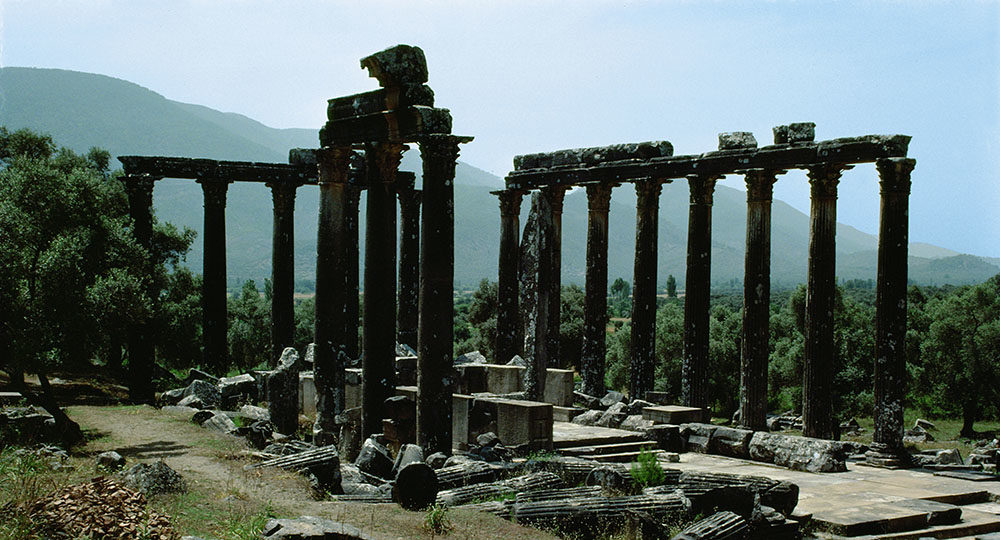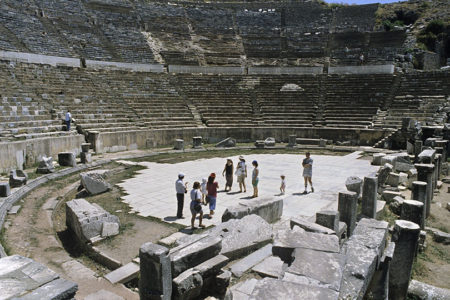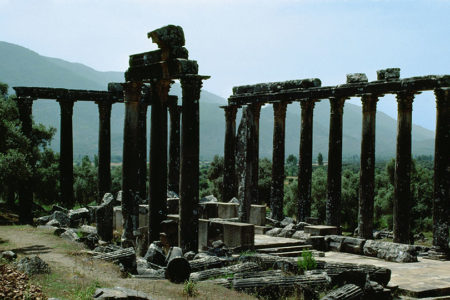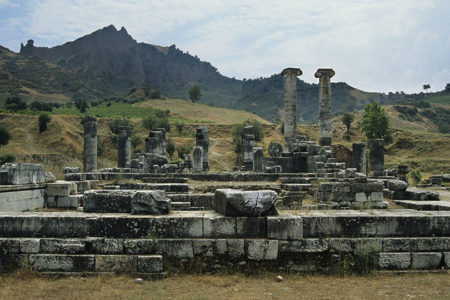The Peril of Compromise Revelation 2:12–17
Like cities that use levees to guard against the destructive power of the ocean, the church must guard against the pressure of prevailing culture. In His third message to the churches of Asia Minor, our Lord drew attention to a failure to resist the invasion of paganism in the church at Pergamos.
Promising to expose insidious doctrines seeping into the church, Christ began, “These things says He who has the sharp two-edged sword” (Rev. 2:12). The double-edged sword refers to the incisive Word of God used in judgment. Walking among the candlesticks that represent the churches addressed, Christ judged based on direct observation:
I know your works, and where you dwell, where Satan’s throne is. And you hold fast to My name, and did not deny My faith even in the days in which Antipas was My faithful martyr, who was killed among you, where Satan dwells (v. 13).
The Lord’s critique offered little praise and hinted strongly at the church’s spiritual decline. Beyond the martyrdom of Antipas, the Lord only commended the church in Pergamos for maintaining a presence in the community.
Twice He mentioned the church’s proximity to Satan’s seat. Contrary to what many believe, Satan is not currently in hell. The Bible refers to him as the “god of this age,” with his capital on Earth (2 Cor 4:4). From earliest times, Babylon was Satan’s center of operation and the axis of pagan and idolatrous practices. After its decline, the ancient mystery religions migrated to the city of Pergamos in Asia Minor.
Pergamos was a sophisticated city with a large university and library of 200,000 handwritten volumes. Its notoriety as an intellectual center encouraged a thriving parchment industry. The city boasted the temple of Aesculapius where, in the courtyard, devotees sought healing through contact with hundreds of slithering snakes. Overlooking the metropolis stood one of the Seven Wonders of the World, the temple of Zeus, with its altar towering 800 feet above the plain. No doubt, satanic influence was oppressive, and the fact that a church existed at all was extraordinary.
The Lord addressed two serious concerns that stemmed from the same problem of compromise: the doctrine of Balaam and the doctrine of the Nicolaitans. Whether we see His message as representing the historic progression of the Church Age or as addressing the unchecked deterioration of a local church, erosion in the walls of separation was, nevertheless, evident in Pergamos:
But I have a few things against you, because you have there those who hold the doctrine of Balaam, who taught Balak to put a stumbling block before the children of Israel, to eat things sacrificed to idols, and to commit sexual immorality (Rev 2:14).
Balaam was a prophet hired by Balak, king of Moab, to curse the nation of Israel as it wandered in the wilderness. (See Numbers 22—24.) On three separate occasions, God caused Balaam to articulate blessing rather than cursing. Failing in his mission, Balaam instructed Balak to develop friendships with the Israelites, enticing them into sinful relationships. Balaam’s teaching resulted in blurring the distinctions between Israel and its pagan neighbors.
In Revelation 2:14, the “doctrine of Balaam” refers to teaching designed to promote cooperation between the church and the world. It is an insidious conciliation stemming from an obsession for acceptance at the expense of sound doctrine. Likewise, the Lord rebuked the church at Pergamos because it espoused the doctrine of the Nicolaitans. It appears the doctrine of Balaam paved the way for the heresy of the Nicolaitans. Although many believe the Nicolaitans instigated the distinction between clergy and laity, there is evidence of a licentious sect led by Nicolas of Antioch, who advocated freedom in conduct and encouraged participation in pagan practices. The doctrine of Balaam allowed interaction with surrounding paganism and culminated in the doctrine of the Nicolaitans, in which promiscuity was actually incorporated into the activities of the church.
In verse 15 the Lord bluntly stated, “Thus you also have those who hold the doctrine of the Nicolaitans, which thing I hate” (cf. v. 6). The church professed to serve the Lord but in practice served popular opinion. Our Lord warned, “Repent, or else I will come to you quickly and will fight against them with the sword of My mouth” (v. 16). In spite of the church’s history and even martyrdom for the cause of Christ, the Lord Himself judges compromise decisively.
There is a note of hope for some in the church:
He who has an ear to hear, let him hear what the Spirit says to the churches. To him who overcomes I will give some of the hidden manna to eat. And I will give him a white stone, and on the stone a new name written which no one knows except him who receives it (v. 17).
The Lord promises provision uniquely suited to overcomers who stand firm in the face of spiritual compromise. Manna represents spiritual sustenance critical to overcomers. The white stone may well be a diamond, corresponding to the Urim the high priest of Israel used to discern God’s will, giving the bearer spiritual stability. The white stone also bears a name known only to the one who receives it, reflecting a unique relationship to the Lord. Withstanding compromise is by no means easy, but with the Lord’s provision, it assures blessing.
Although it was standing for the moment, the church in Pergamos faced the peril of succumbing to the pressure of pagan culture and being flooded by the world. It is a peril every church faces when compromise becomes more important than truth.






